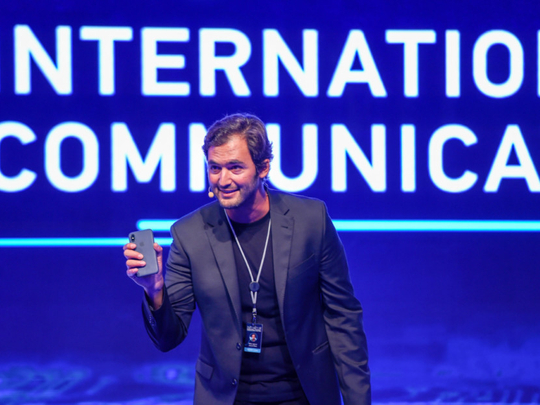
Dubai: People’s misconceptions towards technology are the cause of their anxiety when dealing with the rate of exponential technological change in our world today, Jason Silva, TV host and global speaker, said during the second day of the seventh International Government Communication Forum (IGCF) at Expo Centre Sharjah.
Addressing the audience in an eye-opening session entitled ‘The era of exponential change,’ Silva highlighted that human’s passion for imagination and creativity has turned into a passion for technology.
“I believe that technology is the embodiment of human creativity in the world, and technology is the liberalisation of human imagination in the world, and it is how we turn the human mind inside out,” he said.
However, along with our ability to extend our thoughts, reach and vision through technology, living in an age of rapid change and innovation can lead to a feeling of “a sense of vertigo”.
“Change itself is accelerating, and we are feeling it in real time, and that can be accompanied by anxiety and the feeling of being overwhelmed by the pace of change — it is understandable. Technology has always changed the world, it has always transformed humanity, but it used to happen over many generations, and so people didn’t feel it in real time,” explained Silva.
He pointed out that humans must try to accommodate themselves to rapid transformation within their lifespans.
The reason humans don’t see the future coming lies in the fact that the human brain is trained to think linearly about change, while technological change is exponential.
“The human brain has evolved in a world that is linear and that was local, and we had to calculate change over time. Linear calculations are in our DNA — but we don’t live in a linear local world anymore, we live in a world that is global and exponential,” said Silva.
He explained that human intuition, instinct and wiring still think about change linearly, which leads people to feeling “caught off guard” when change continues to happen exponentially.
“We need to learn what exponential change means not only intellectually, but emotionally and physically,” said Silva.
Focusing on pace, he highlighted the difference between linear change and exponential change.
“If you take thirty linear steps — step by step — it gets you to 30. But this is not how technological change happens. If you take the same amount of step exponentially 2-4-16 ... by step 30 you’re at a billion. Taking the same amount of steps gets you to either 30 or a billion,” he said.
Silva added this is the reason why the smart phone in our pocket today is a million times cheaper and smaller, yet a thousand times more powerful than what used to be a $60-million super computer that was half the size of a building, 40 years ago.
“That is exponential progress — and in the next 25 years, this technology will shrink down to the size of a blood cell. It will augment our intelligence billion folds. This is where we are heading,” said Silva.
The two-day forum is being held under the theme ‘Digital Millennium … Where To?’, hosting more than 2,500 regional and international participants, representing both government and private sectors.
Organised by the International Government Communication Centre (IGCC), speakers from over 16 countries participated in 11 discussion, exploring the rapidly transforming role of both public and private entities in the new digital age.






